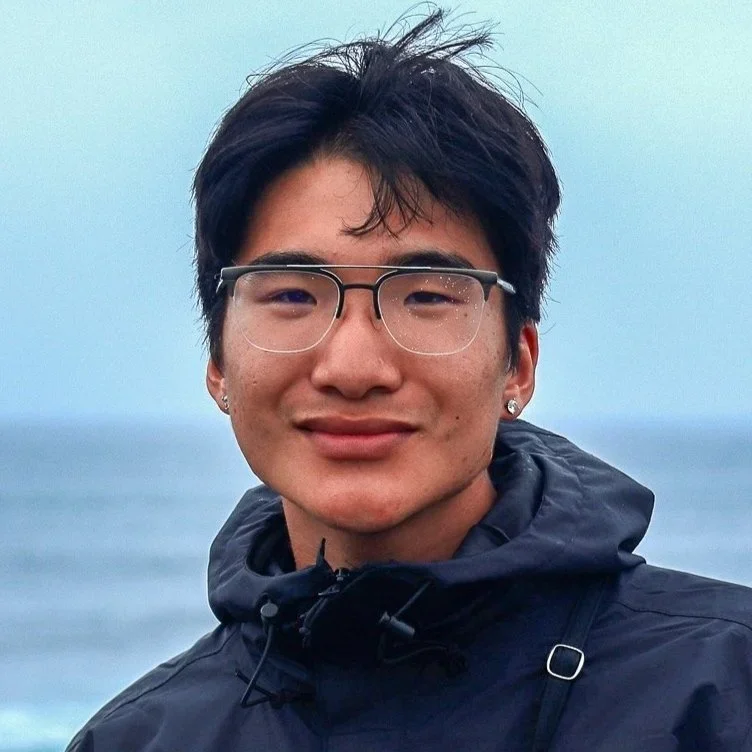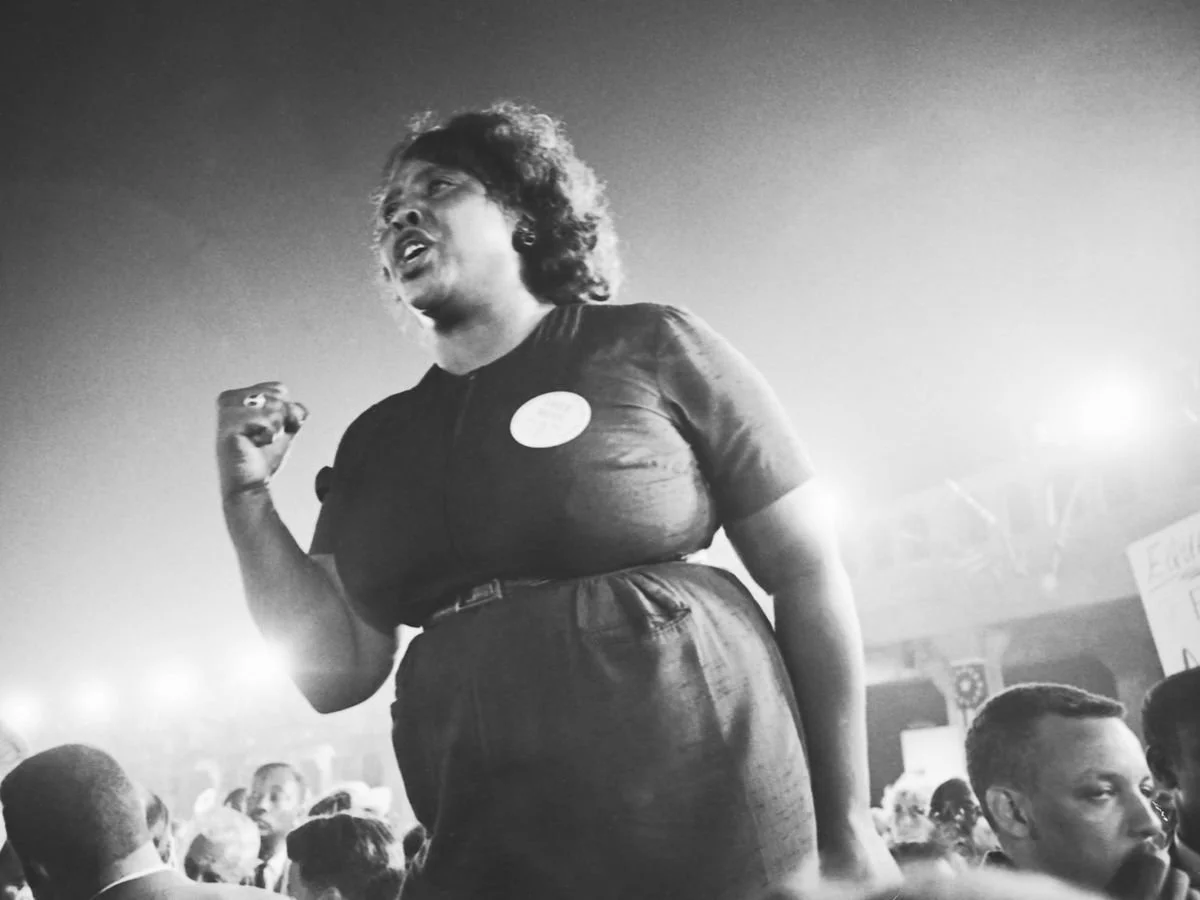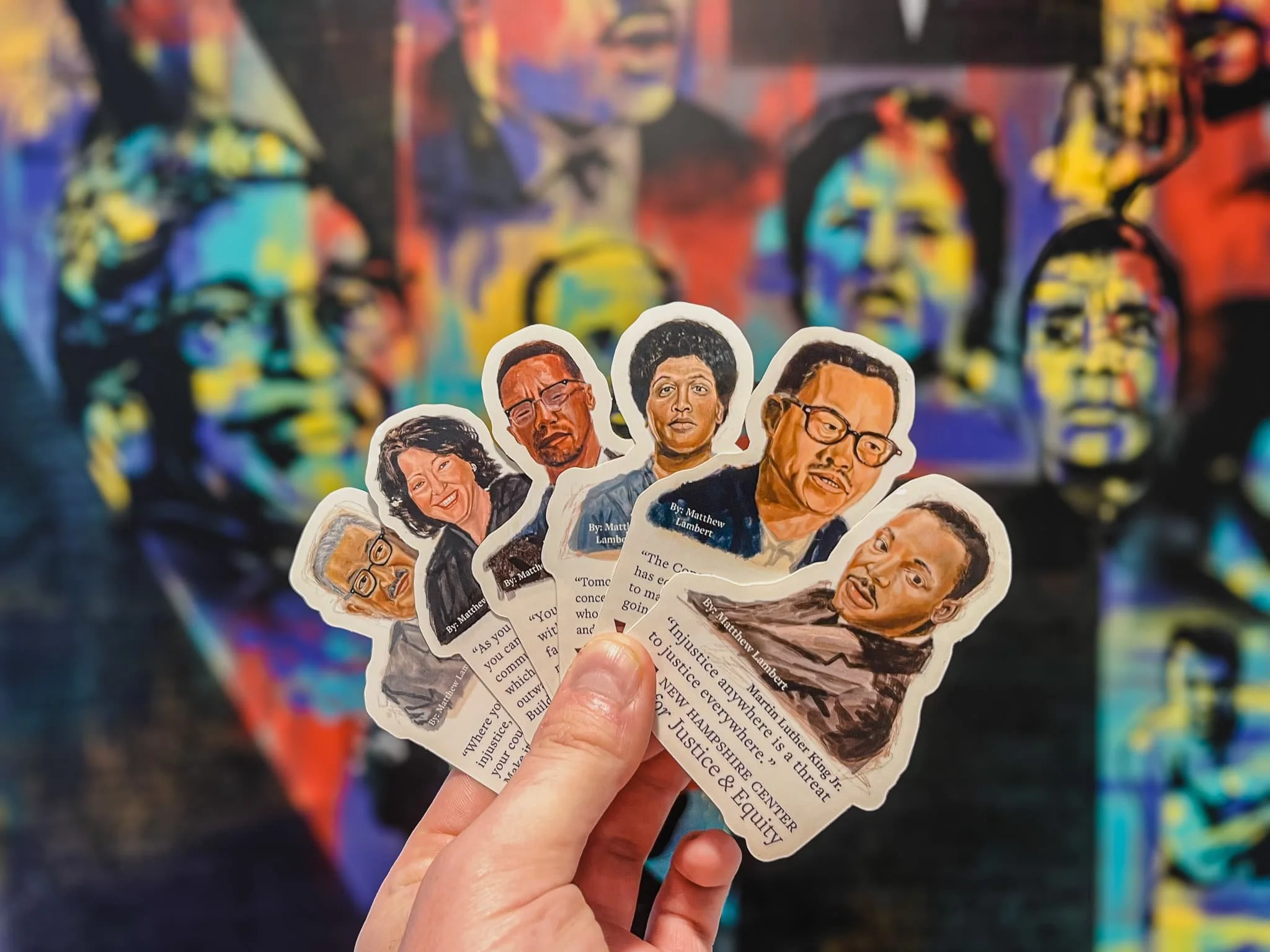
Honoring Our Justice & Equity Pioneers Through Art
The Icon Series
As part of our ongoing commitment to justice and equity, the New Hampshire Center for Justice & Equity (NHCJE) launched its first Icon Series in the fall of 2023, a collection of stickers designed by Matthew Lambert, our intern from Wheaton College. This series pays tribute to those who have paved the way for equity and justice across various fronts, including civil rights, racial justice, disability rights, LGBTQ+ rights, workers' rights, and more. Each individual has played a critical role in shaping today’s landscape, and their inclusion in the Icon Series is a call to remember and continue their work.
“Art does an amazing job at taking a movement or a message and screaming it to people in ways words alone cannot reach. Whether it’s Felix Gonzalez Torres creating an installation out of hard candy that comments on the HIV/AIDS epidemic, or Kara Walker building a giant Black goddess (out of sugar) in a sugar factory that was built from the products of slavery, art can be so powerful when asking for change. I think it is limitless as a tool for justice and equity. It can inspire people to make positive change within their own communities, but it can also advocate for big change boldly.”
— Matthew Lambert
The 2025 Icon Series
-

Rosa Parks
Rosa Parks was a civil rights activist whose refusal to give up her seat on a segregated bus in Montgomery, Alabama in 1955 sparked the 381-day Montgomery Bus Boycott and ignited the broader Civil Rights Movement in the United States. A dedicated member of the National Association for the Advancement of Colored People (NAACP), she worked for years as an activist, advocate, and educator committed to desegregation, racial justice, dignity, and opportunity for all.
-

Frederick Douglass
Frederick Douglass is known for being one of the most influential abolitionists, orators, writers, and reformers of the nineteenth century. His life embodied the struggle for liberation, the belief in education as a pathway to empowerment, and the conviction that reporting the truth could dismantle oppression. Through his writings, activism, and public service, he transformed the fight for abolition into a broader vision of human rights.
-

bell hooks
bell hooks was a trailblazing writer, feminist, and cultural critic whose work transformed how we think about race, gender, class, and love. She dedicated her life to making complex ideas about oppression accessible to everyone. Author of around 40 books, her award-winning work challenged systems of domination and called for a world rooted in care, community, and justice. As a teacher and theorist, she believed education should be a liberating act. Her legacy is a guiding light for equity, love, and social transformation.
-

Fannie Lou Hamer
Fannie Lou Hamer was a fearless civil rights leader whose voice rose from the cotton fields of Mississippi to the national stage. She was a powerful advocate for voting rights, economic justice, and Black political representation. As a co-founder of the Mississippi Freedom Democratic Party, she exposed racial violence and voter suppression. Through grassroots organizing, Hamer fought for dignity, self-determination, and equality.
-
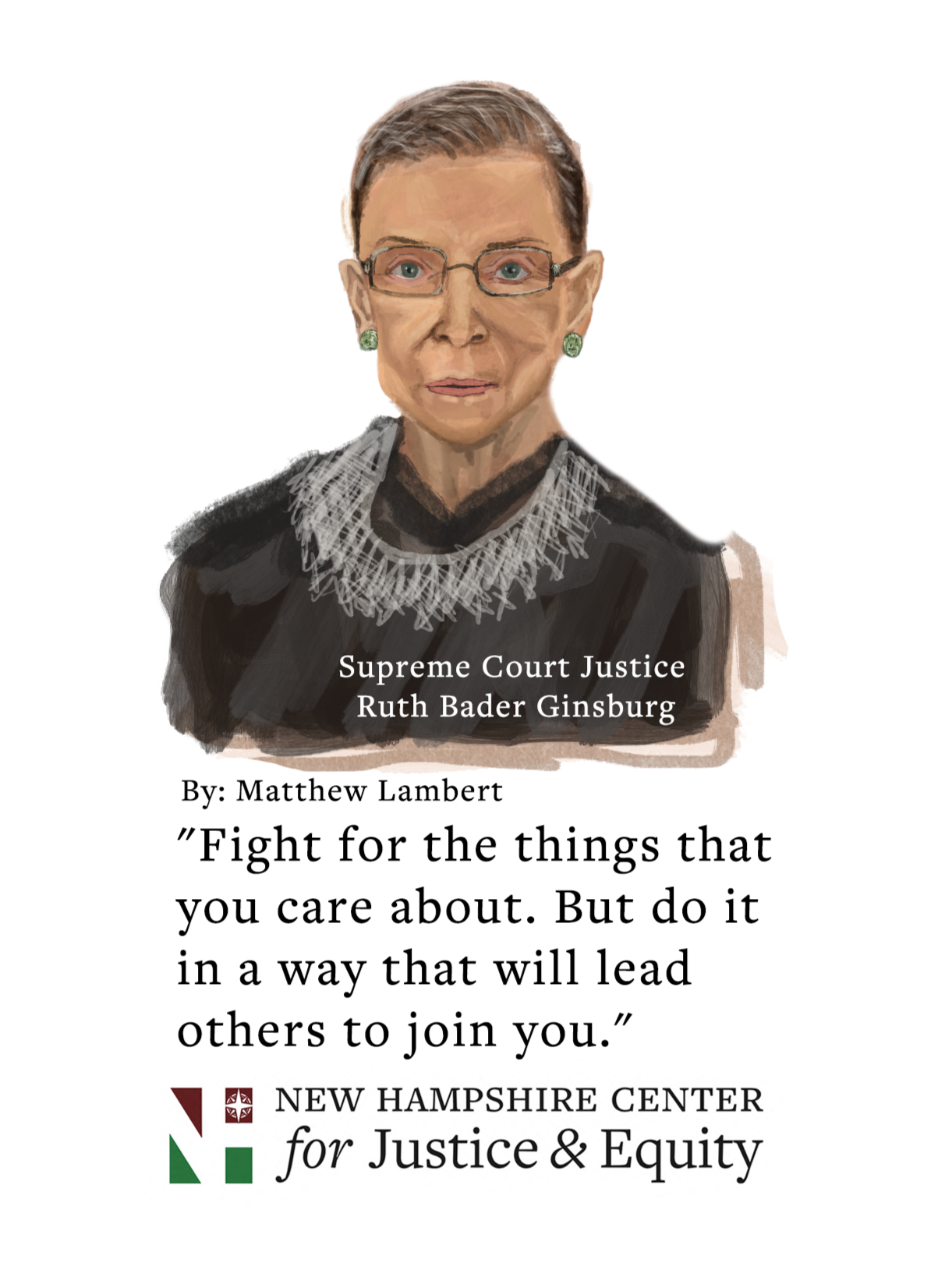
Ruth Bader Ginsburg
Ruth Bader Ginsburg, often referred to as RBG, transformed the American legal landscape through her work as a lawyer, Supreme Court Justice, and champion for gender equality. From co-founding the ACLU’s Women’s Rights Project to serving 27 years on the U.S. Supreme Court, she dedicated her life to ensuring equal protection under the law. Known for her sharp intellect, strategic advocacy, and powerful dissents, Ginsburg embodied justice in the legal system.
-

W.E.B. Du Bois
W.E.B. Du Bois was a sociologist, historian, civil rights activist, and one of the most influential thinkers of the 20th century. As a scholar and co-founder of the NAACP, Du Bois exposed the structural roots of racism and challenged America to live up to its democratic ideals. Through his research, writing, and advocacy, he helped shape the modern civil rights movement and inspired generations to continue the struggle for equality.
-

Ida B. Wells
Description Ida B. Wells stands out as a fearless historical figure from the late 19th and early 20th centuries. An investigative journalist, suffragist, and founding member of the National Association for the Advancement of Colored People (NAACP), she refused to stay silent in the face of terror, challenging racial violence and the structures that sustained it. Her most notable work is the anti-lynching book A Red Record, where she documented lynchings and related statistical data, exposing their brutality and baseless justifications.
-

Nelson Mandela
Nelson Mandela was a freedom fighter, political leader, and global symbol of resilience whose lifelong struggle against apartheid reshaped the moral landscape of the 20th century. From his early activism with the African National Congress to his 27 years of incarceration and his historic presidency, Mandela championed equality, reconciliation, and human dignity. His leadership transformed South Africa’s path toward democracy and inspired movements for justice around the world.
The 2024 Icon Series
-

Larry Itliong
Larry Itliong was a Filipino-American labor leader and activist who was pivotal in the American labor movement. He organized West Coast farmworkers, notably leading the Delano Grape Strike in 1965, which united Filipino and Mexican laborers and helped form the United Farm Workers (UFW). An advocate for racial equity and workers' rights, Itliong's efforts improved wages and conditions for thousands of agricultural workers. Though often overshadowed in history, Itliong's role in the labor movement helped shape the modern pursuit of economic and racial justice.
-

Martin Luther King Jr.
Dr. Martin Luther King Jr. dedicated his life to pursuing justice, equality, and peace through nonviolent resistance. Born in a segregated South, he rose to prominence during the Civil Rights Movement, leading actions like the Montgomery Bus Boycott and delivering his iconic “I Have a Dream” speech in 1963. Dr. King fought for racial equity and economic justice, envisioning a world where all people could thrive. Though his life was tragically cut short, his legacy endures as an inspiration.
-

Audre Lorde
Audre Lorde was a self-described ‘Black, lesbian, mother, warrior, poet’ whose work and activism challenged racism, sexism, homophobia, and class oppression. She used her writing to explore the intersections of her identities and to call for justice and equity. Lorde’s poetry became a powerful tool for resistance, and her essays critiqued the failure of mainstream feminism to address race and class. Lorde believed in the power of naming one’s experiences and emphasized solidarity among marginalized communities. Her legacy continues to inspire intersectional approaches to social justice.
-

Thurgood Marshall
Thurgood Marshall was the first Black Supreme Court Justice and a pioneering civil rights advocate. He played a crucial role in landmark cases, including Brown v. Board of Education, which ruled school segregation unconstitutional. Marshall also served as NAACP’s legal counsel, arguing cases to combat racial discrimination and promote social justice. Appointed to the Supreme Court in 1967, he championed racial equality affirmative action, demonstrating the importance of using the law as a tool for change.
-

Sonia Sotomayor
Sonia Sotomayor is the first Latina and the third woman to serve on the U.S. Supreme Court. Her journey from a public housing project to Princeton and Yale Law, and later to the highest court in the country speaks to the power of perseverance and the importance of representation. Known as the "People’s Justice," she embodies empathy in law, advocating for marginalized communities and offering hope to those seeking to overcome systemic barriers. Her legacy proves that those historically excluded can indeed shape the future of justice and equity in America.
-

Malcolm X
Malcolm X was a powerful voice for Black empowerment and racial and economic justice. After the murder of his father, and a difficult childhood, he transformed his life during a prison sentence, embracing the Nation of Islam’s teachings and emerging as a prominent leader. Advocating for Black Power, self-defense, and economic independence, he challenged systemic racism with bold, assertive rhetoric promoting unity and global solidarity. Assassinated in 1965, Malcolm X's legacy endures as a symbol of resilience, transformation, and the fight against oppression, inspiring worldwide Black pride.
The 2023 Icon Series
-

Cesar Chavez
Cesar Chavez was a Latino civil rights activist and a community organizer with a specific interest in labor movements for farm workers. Chavez grew up in the 1930s and 40s as a migrant farm worker with his family. He became well aware of the inequities of the labor system for immigrant and Latinx farm workers. As an adult in the 1950s, Chavez set his sights on creating a union for the farmers he had seen suffering his whole life - which at the time was seen as an impossible task. He succeeded by founding the National Farm Workers Association (now the United Farm Workers of America), the first farm workers union in U.S. history. Chavez’s work spanned from creating the first credit union for farm workers to building affordable housing. NHCJE chose him as a sticker to commemorate his commitment to creating a better world for his people.
-

Angela Davis
Angela Davis was the first sticker made. Davis is known for being falsely accused as a terrorist in the 70’s and spending 18 months in jail for a murder crime that she did not commit. She then became a strong advocate for the abolition of mass incarceration and the prison industrial complex. Angela Davis is also a member of the LGBTQ+ community and sits at the intersection of race and gender. Her fierce and calculated approach to fighting for justice is visible in all her actions. Her persistence to challenge the justice system in America and continuing to push for equity makes her a clear choice to represent NHCJE ideals.
-

Judith Heumann
Judith Heumann was also made into a sticker for her endless achievements as an activist for people with disabilities. Judith Heumann was diagnosed with polio at 18 months old and used a wheelchair from then on. Heumann fought tirelessly for the Americans with Disabilities Act, Section 504, and other important legislation that supports people with disabilities. Judith Heumann’s passion for justice and her contributions to changing how we all see disabilities cemented her as an activist leader forever. Her work speaks to how people with disabilities cannot be left out of the picture, and that the world needs to be built equitably for all. NHCJE continues to carry this message.
-

Marsha P Johnson
Marsha P. Johnson is one of the most prominent names in the fight for LGBTQ+ rights. Born in 1945, Johnson was a transgender woman at a time when her identity was seen as wrong and threatening to her home state of New York. In 1969, Johnson witnessed the police raid on the Stonewall Inn. This sparked her advocacy for her own community. She went on to not only be a frontrunner in the building of the gay rights movement but also challenged the movement to better incorporate people of color at the intersection of gender and race. As a legendary leader of the LGBTQ+ community, Marsha P. Johnson built safe spaces for trans youth, strengthened organizations for gay rights, and fought against the stigmatization of H.I.V/A.I.D.S. NHCJE is inspired by Marsha P. Johnson and the way she built a pathway for the Black LGBTQ+ community to be seen, acknowledged, and supported.
-

Yuri Kochiyama
Asian American activist Yuri Kochiyama also inspired a sticker. Kochiyama was born to Japanese immigrants in 1921 and became an activist in the 1960s during the Civil Rights Movement. She famously worked closely with Malcolm X and was inspired by his work fighting for the Black community. Kochiyama was chosen as a sticker for her actions as an Asian American activist, but also her beliefs that the Black and Asian communities are stronger together when fighting systems of oppression. NHCJE echoes Yuri Kochiyama’s values that communities of color are more powerful together. Kochiyama is a bright reminder of what can be accomplished through community and collaboration.
-

John Lewis
John Lewis was one of the most renowned leaders of the Civil Rights Movement and fought for social justice for over 40 years. His actions included segregated lunch counter sit-ins, risking his life as a part of the Freedom Riders, and being one of the top political leaders in the country. Lewis served in many forms of government including the Atlanta City Council, Georgia's Fifth Congressional District, the Senior Chief Deputy Democratic Whip, the Congressional Black Caucus, and much more. Overall, Lewis was an experienced seeker of justice who used his positions to fight for equity for all. Inspired by his commitment to “good trouble”, he is a daily reminder for the NHCJE to commit to the mission at hand.
About The Artist
Matthew Lambert is a visual artist based in Hampton, NH. Lambert completed his BA at Wheaton College, where he majored in Visual Art, & minored in the Political Economy. Matthew's current work centers around his identity as a Korean American, adoption, & one's relationship to home & displacement. Matthew's goal at The NH Center for Justice & Equity is to help build the visual foundation of the center that will result in meaningful change down the line.
Matthew Lambert
The Inspiration: Art by Positive Street Art
Artistic expression preserves the history of social movements, ensuring that the struggles and achievements of each time are remembered and honored by future generations. Beyond serving as a record, art also has the unique ability to inspire and mobilize people to action. A powerful piece of art can evoke deep emotions, such as anger, compassion, or hope, that compel individuals to participate in social movements and advocate for change
The importance of art as a tool for social change is a core belief of NHCJE. When NHCJE was first founded, Nashua’s Positive Street Art— which leverages urban art to build strong communities through educational workshops, community events, and artistic services— created pieces for the office space. These original artworks included a painted collage of social justice activists and leaders, cleverly incorporating NHCJE’s logo within the work, as well as paintings of activists Audre Lorde and John Lewis. These pieces, which hang prominently in the NHCJE office today, were created as a way to not only celebrate and identify those who came before us, but to remind us of the importance of carrying on their work and legacies.
This powerful sentiment served as the inspiration for NHCJE’s very own art-activism project— The Icon Series.
PSA’s painting of Audre Lorde.
PSA’s painted collage of justice leaders and advocates.
PSA’s painting of John Lewis.
Continuing the Tradition: PSA’s newest mural for the NHCJE office, titled ‘Unsung Heroes’, featuring Clyde Warrior, Claudette Colvin, and Dolores Huerta.
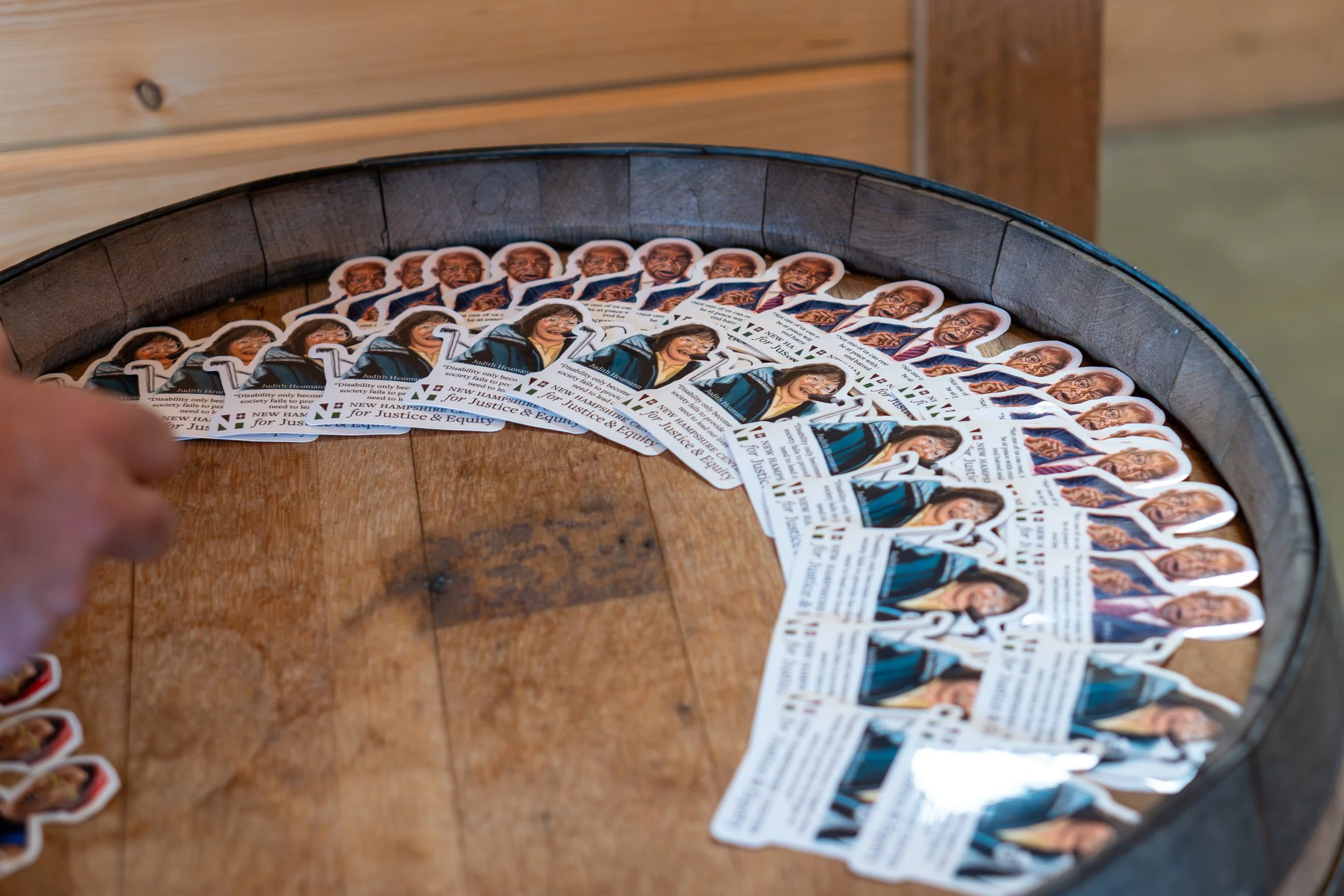
NHCJE welcomes community nominations for icons for the Icon Series. When it comes time to release a new set of stickers in the series, we conduct research about the recommendations and NHCJE’s Board and staff vote on which individuals should be included in the next series.
Who is an individual that inspires you? Please tell us about them!

